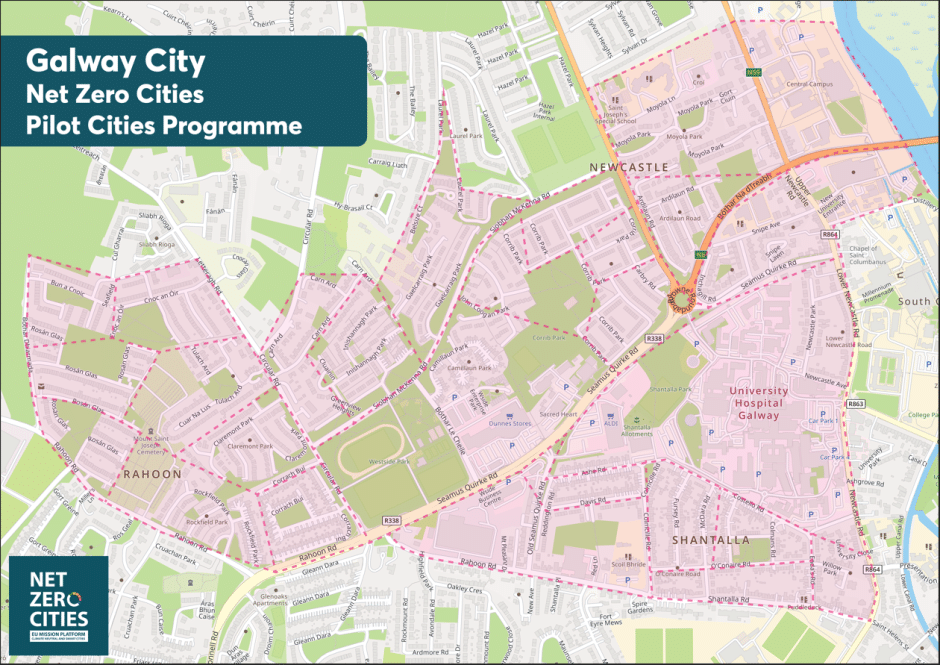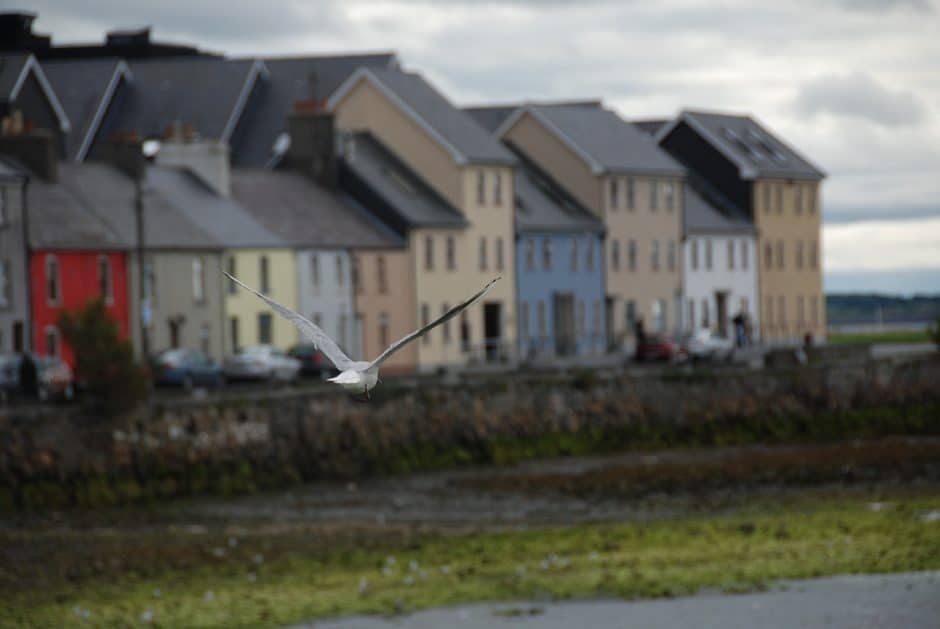Galway’s Westside gains ground for net zero goals
In The News
30 Aug 2024
“The climate neutrality targets of 2030 and 2050 are closing in on us,” says Sharon Carroll, as she reflects on the formidable challenge ahead. “The level of action that’s needed is almost a barrier in itself, because it can be so overwhelming,” says Carroll. Galway, where Carroll is the Project Coordinator for the Irish city’s participation in the NetZeroCities Pilot Cities Programme, led by EIT Climate-KIC, has pledged to reduce greenhouse gases by 51% by 2030 and become carbon neutral by 2050.
In 2019, Ireland became the second country in the world to declare a climate emergency and has since introduced legislation that commits it to becoming carbon neutral by 2050, in line with international goals. Recognising the essential role cities play in reducing greenhouse gas emissions and energy demand, Galway has stepped up to the challenge.
“There’s a temptation to ‘leave it to the environmentalists’, because it’s so daunting to think about,” she says, “but we know that we need to get everyone together and mainstream climate action into all parts of society if we are to be effective.” says Carroll.
Setting the pace
The weight of possible failure encourages urgency and speed to meet European and global targets.
Carroll, responsible for implementing Galway’s Net Zero Pilot, feels torn between acting quickly and acting intentionally to allow for impactful acceleration down the line. It’s a difficult balance to strike, but the key to success may be in challenging the way we understand and enact change, and knowing how to set the pace.
“There are so many things going on – Ireland’s housing crisis, the cost-of-living crisis – not to mention just what’s going on in people’s private lives. We are trying to get everyone to a point so that we can accelerate together, but that’s extremely difficult and a lot of work goes into even getting people to a point where they are ready to get ready,” says Carroll.
Galway’s intention, including through the Pilot Cities Programme, is to move from individual to collective action, mobilise the community and affect real change.
Supported by project partners the Northern & Western Regional Assembly, the Galway Energy Co-operative, the University of Galway and the Atlantic Technological University, the project has the goal of retrofitting 250 private homes in the Galway Westside area – buildings that the council has no direct influence over – during a two-year period.
The project is structured around three focus areas: the first is setting up a community hub – a place where locals can find information and advice on how to go about retrofitting their homes. The second addresses skills in the workforce, aiming to bridge the gap between available skills and the level needed to match demand. The third links the project to a wider context via a new steering group of decision makers from various sectors who can provide advice and links to their networks.
“The project aims to retrofit homes, but it’s about much more than that,” explains Carroll. “And it’s centred around people, place and process.”
The importance of people
The ‘people’ part of the equation is addressed through the community-based Warm Home Hub. It is a free-of-charge consultancy service for people who live in the Galway Westside area, providing information on tailored solutions for upgrading specific homes.
“The first year has been mostly about learning, planning and meeting local people,” says Kieran Cunnane, Manager and Technical Officer at the Warm Home Hub. Reflecting on this time, Cunnane says, “we have managed to reach quite a few of the local people, but it’s been mostly low-hanging fruit. In the second year, we want to get more people involved and reach new target groups.” With the first year of learning completed, Cunnane and his team feel ready to go deeper and bring more people with them on the retrofitting journey.
The community hub will cast a wider net through complementary activities, like ramping up their online presence and offering energy efficiency awareness sessions. The hope is to see meaningful uptake in the hub’s advisory services and in the retrofitting of private homes in the area as an intentional by-product.
“On a positive note, we’ve seen that while it takes a lot of effort to get people interested, once they’re on the journey, the momentum tends to really pick up. We want to help build that momentum, and then clear the pathway,” says Carroll.
According to Carroll, the second year will also be about connecting with other local projects working in the climate and sustainability field, like The Air We Share and Galway City Climate Festival. The goal is to standardise the messages going out into the community to show a united front, rather than a flurry of seemingly separate climate projects.
The decarbonising zone
All local authorities in Ireland have chosen decarbonising zones, designated areas within their city where climate mitigation measures apply. Galway City’s decarbonisation zone is the ‘place’ for their pilot activities. The area provides socio-economic diversity, varied types of housing and a good mix of privately and publicly owned buildings, which will cater to testing and learning about different local realities.

“There are other initiatives in different areas of Ireland that are effectively working on retrofitting houses, and some are ahead of us in making up these sustainable energy communities and pooling people together into a collective,” says Cunnane. “The difference for us is we have a small area that is higher on the deprivation index, so we’re trying to convince people who never considered retrofitting to start thinking about it.”
If Galway and other cities are to meet government targets, going beyond the low hanging fruit and meaningfully engaging people who haven’t even considered upgrading their homes is a must.
Sandra Riordan, Community Energy Officer at the Warm Home Hub, reflects on the neighbourhood they’ve integrated into.
“This is a really lovely, tight-knit community. People don’t want to leave their homes, but a lot of them have trouble even just keeping them warm.”
Serving a mixed demographic, including an older generation having trouble insulating their homes to younger people who have now taken on a new mortgage, the hub is well placed to bring tailored solutions to specific circumstances.
“It’s not easy in Ireland to just sell your home and get another one, so small improvements are a really valuable way of serving the climate, our health and well-being, saving on energy bills, and maintaining the quality of our homes,” continues Riordan.
The pre-designated area functions as a test bed for the Net Zero Pilot, offering place-based learning and local insights that can inform future scaling and replication efforts.
“We are using the decarbonising zone to test what works in a specific area, learn how to mobilise the community into wider action, and identify patterns and groupings that could exist in other places,” explains Carroll.
What about the workforce?
Having looked at people and place, the question remains whether there are enough skilled workers to actually do all the work. When it comes to skills required for retrofitting, there is already a shortage in local tradespeople.
“For the time being, there are a few gaps if you just want to get your house insulated, or install solar panels, which we’ll be relaying to our steering group. But the real shortages will come when we start scaling up, and there are a lot of studies showing that we don’t have the right capacity in the labour force,” says Carroll.
To address this gap, the project’s goal is to train 60 extra people. They also want to convince companies and professionals to see the value in expanding retrofitting knowledge across construction sectors, provide the right training, and preparing for scaling up.
“The questions we’ve been exploring with other actors in the retrofitting chain are whether there enough contractors working in Galway and adequate courses to train them. If there aren’t, what do we need? Are there any barriers to people taking up this training, and how can we address them and incentivise people to do the training? Some ideas we’ve been looking at is getting more females into construction, or working with minority groups in the city, or working with young people who are just getting into training,” says Carroll.

Leveraging local insights for systemic change
The people and the place inform the process, and, for Carroll, framing the project around learning and insights has provided the necessary space to optimise the approach.
Year one saw the set-up of the Warm Home Hub, its integration into the community, and the roll out of its advisory services. As they enter the second year, Carroll feels that the experience of learning, sharing, consulting and reflecting will result in more thought out and informed decisions in the following stages, and a feedback loop between experience and next steps.
Through the steering group, lessons learnt, feedback, and experiences are also relayed to decision-makers on a regional and national level, highlighting local experiences higher up the ladder. “We have a quadruple helix steering group, and they are how we work on strategic change,” explains Carroll.
The group includes members from the private sector, financial institutions, energy agencies, government departments, and academic institutes. In total there are eighteen people on it, and they provide the city with a level of governance and oversight, while also providing with a channel to bring recommendations to a higher level.
“The joy in this project is in that it gives us the space to learn, experiment, and gather ground to get everyone to a similar level. Then we can really accelerate, together, towards the 2030 target,” says Carroll. “The project will end in a year. The capacities and skills we’ve developed, and the relationships we’ve formed with local people have been really meaningful. I hope those will outlive the project and contribute to the bigger picture of getting everyone on board to take this journey with us.”
Levelling the playing field
As Galway city, the Warm Home Hub and their partners gear up for a second action-packed year in Galway’s Westside community, they share a few hopes for the future.
“We’d like to see efforts towards levelling the playing field when it comes to retrofitting,” says Riordan.
Things like offering a free initial assessment and providing more grants for smaller upgrades makes it easier financially, and thus more likely, that people will be able to upgrade their homes. Additional grants for essential renovations like upgrading windows and doors (which are not currently available for grant funding, despite being some of the most important but costliest upgrades) would also really support homeowners who don’t have as much disposable income.
“The key is getting more people onto the retrofitting ladder to increase the prospects for large-scale change,” explains Riordan.
Running against the clock, Galway and their partners are prioritising community involvement to mainstream climate awareness and action, making sure everyone is together and ready for the race.
This article is part of EIT Climate-KIC’s #LiveableCities Campaign, where we explore the pathways to a climate neutral, just, and more beautiful future. By 2030, our goal is to help transform over 400 cities into thriving, climate-resilient communities. This campaign captures the stories and lessons of ambitious cities in Europe and around the world. We want to show a vision of what’s possible when cities and stakeholders come together to tackle the climate crisis.



